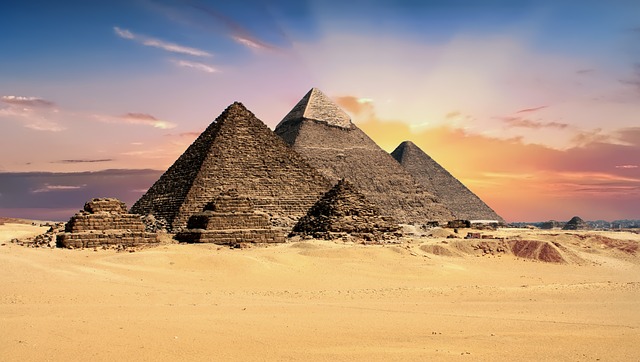
This week we read the parsha of Ki Seitzei. I would like to apologize for the lack of ‘Insights’ during the past weeks. Traveling with my family, it was most difficult finding the time, peace of mind and ideas necessary in order to write. I hope that I’ll be able to draw from some of my experiences during my trip, thereby rendering the trip worthwhile for us all.
Ki Seitzei discusses many different mitzvos and ideas but there was one that really struck me. The parsha discusses the different nations and their ability or inability to join the K’hal Hashem. (Even though they will be accepted as converts, there will be severe restrictions on who they will be allowed to marry. That is the meaning of K’hal Hashem.)
Male members of the nations of Amon and Moav cannot marry into the K’hal Hashem. Even ten generations after the original conversion, the K’hal Hashem is off limits to the descendants. [23:4]
However, when it comes to our good friends the Mitzrim {ancient Egyptians}, a different law applies. “Do not abhor the Egyptian because you were a stranger in his land.” Rashi points out that our stay there was no vacation–they ultimately threw our newborn boys into the Nile–nevertheless, since they were our hosts in our time of need (when we first went down to Mitzrayim), “the third generation (the grandchildren of the original convert) can enter the K’hal Hashem.” [23:8-9]
(To avoid any confusion or misunderstandings, I would like to point out that these post-conversion marriage restrictions apply to the ancient nations of Amon, Moav, (Edom) and Egypt. All other nations were able to convert and enter the K’hal Hashem immediately. Since all of the nations have been moved and mixed up over time, any modern day convert has the status of the vast majority of nations, and can enter the K’hal Hashem with no marriage restrictions.)
We look back on relationships and experiences that we’ve had and we see that there were positive and negative aspects. It happens quite often that if, when we make the tally, there seems to have been more negative than positive, we will then view the entire relationship or experience in a negative way. We’ll feel freed from the need to show appreciation for that which we did gain.
Our parsha illustrates the piercing hakaras hatov {sense of gratitude} that a Jew must not just feel but act upon. All of the horrors that we as a nation endured during the enslavement in Mitzrayim cannot erase that relatively minute benefit that we gained from them. The first two generations cannot enter the K’hal Hashem–they drowned our children–but the third generation can–they hosted us when Yaakov first descended.
At the same time, perspective must be maintained and we can’t allow ourselves to be stepped upon. The Talmud [Sanhedrin 91.] relates that the Egyptians came before Alexander with a grievance against the Jews. Quoting the verse that the Jews took vessels of gold and silver on the way out of Mitzrayim, they demanded compensation.
A fellow by the name of G’viha ben P’sisa went to argue the case for the Jews. “Just as your source was a verse from the Torah, I will also draw from a verse in the Torah. ‘And Bnei Yisroel were in Mitzrayim for four hundred and thirty years.’ You Egyptians owe us the wages of six hundred thousand workers who put in four hundred and thirty years of work!”
Alexander, impressed by his line of argument, offered the Egyptians a chance to respond. They asked for three days to craft a response. When the three days passed and they still had no way to counter the argument, they left town in a hurry.
More than their due we needn’t give but their fair compensation cannot be ignored. When it comes to hakaras hatov, details cannot be washed away by the overall picture.
Sometimes, however, the obligation of hakaras hatov requires us to ignore a detail and focus on that overall picture.
The family trip that we took was primarily to attend a wedding in the USA of a very close friend and talmid {student}, and to visit and spend time with close family. Due to a disparity in ticket prices, on our way to the States we were able to spend a Shabbos with close friends in England at virtually no extra cost. Shabbos was beautiful and the opportunity to experience a different country with my family was truly a once in a lifetime (on a Rabbi’s salary!) experience.
Our continuing flight to New York wasn’t until Monday, allowing us to spend Sunday touring the Tower of London and taking a boat ride up and down the Thames River. Every part of the day was an experience, including even the bus and train rides to and from.
As we got off the last train, ready to return to the home of our friends, I was filled with a serene feeling of contentment and thanks to Hashem for having allowed my family to share such an experience. That feeling was permeating throughout my entire body until the moment that I reached into my pocket and realized that it was empty–my wallet was gone.
British pounds, American dollars, Israeli shekel–gone. Israeli license, New York license–gone. Credit cards, debit cards, bank cards–gone. Last but certainly not least, my wallet-sized wedding picture that I’d carried for eighteen years minus a few days–gone.
Suddenly, it was nausea that was permeating throughout my entire body. I felt that detail of the lost wallet washing away the entire experience. I was in danger of confining my memory of the England trip to a lost wallet…
Hakaras hatov to others is the stepping-stone to hakaras hatov to Hashem. It is on that foundation that we can build our avodas {service to) Hashem. At times it requires dwelling on details and at times it requires ignoring them. As we prepare for the upcoming Yomim Nora’im {Days of Awe–Rosh Hashanah and Yom Kippur} the focus must always be a feeling of profound appreciation for all that He has given us.
Good Shabbos,
Yisroel Ciner
Copyright © 2000 by Rabbi Yisroel Ciner and Project Genesis, Inc.
The author teaches at Neveh Tzion in Telzstone (near Yerushalayim).


